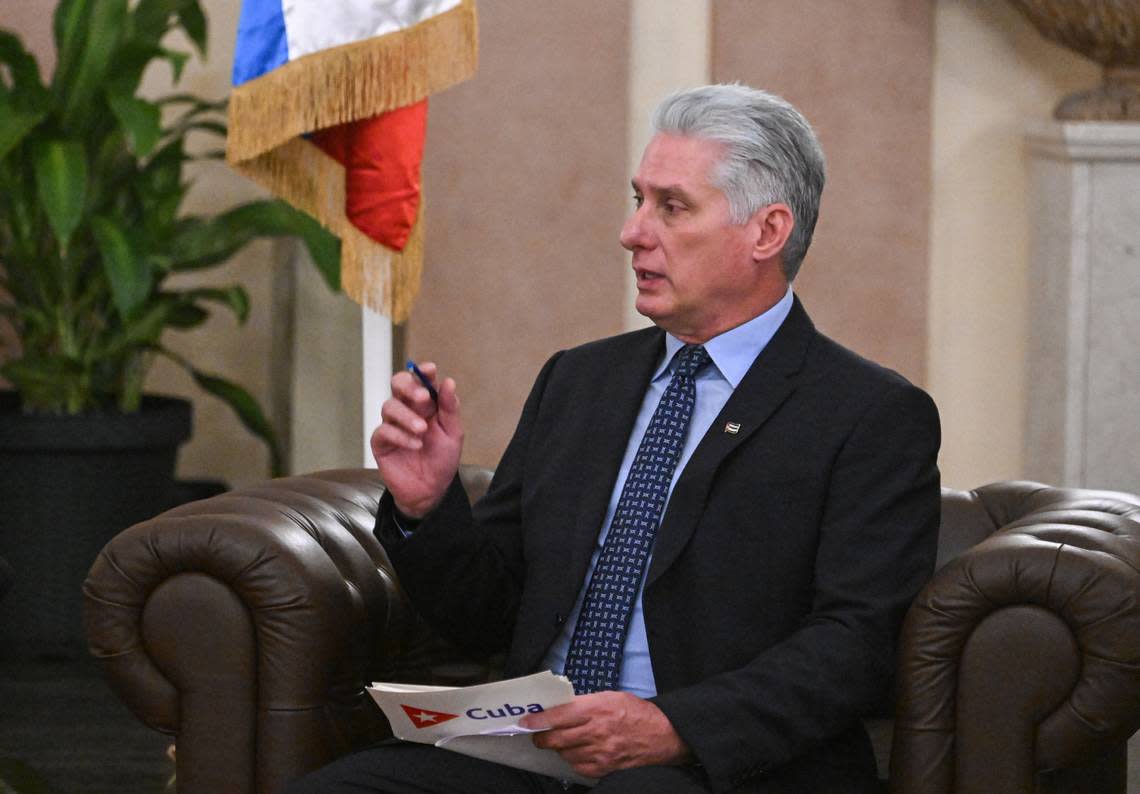In a reversal, Cuban authorities impose price caps on food despite warning of shortages

The Cuban government has imposed price caps on some imported food despite initially signaling it was willing to hold off after private business owners warned the measure would force them to stop importing chicken, powdered milk and other essentials, increasing the public risk of hunger.
According to a new regulation published in the Cuban Gazette on Monday, the price of chicken parts sold by private businesses to consumers cannot exceed 680 Cuban pesos per kilogram starting immediately. Current wholesale prices on the island are over 700 pesos, and a kilogram — 2.2 pounds — of chicken thighs can cost more than 900 pesos in a private store.
The official gazette also published new capped prices for powdered milk, sausages, pasta, cooking oil and detergent sold by private businesses. The government did not impose similar price limits on food sold at government stores.
In a late June meeting with two government officials, private business owners resisted the proposed caps, arguing the government had used a ‘fictitious’ dollar exchange rate for the calculations and did not factor in the heavy taxes and fees private importers must pay.
According to a secret recording of the meeting obtained by the Miami Herald, the entrepreneurs warned that the measure would exacerbate food shortages in the middle of summer, a time when public unrest has historically spiked amid the heat and electricity blackouts.
Leaked audio: Cuban government halts food price caps after backlash from private sector
Because the government is essentially bankrupt and unable to buy food abroad and private farmers have no incentive to produce, Cubans increasingly depend on foreign aid and small private businesses to eat. The price limits are still way over what most Cubans can afford, in a country where the average state salary is around $11 or 4,000 Cuban pesos a month.
However, the entrepreneurs said during the meeting that their prices were driven by the heavy taxes they have to pay the government and asked for the suspension of the 10% sales tax. The Monday regulation comes with a suspension of custom tariffs for the six products, which the entrepreneurs already said at the meeting was insufficient to drive the prices down.
Small and medium private businesses face restrictions on using the money deposited in Cuban bank accounts, tkey have to buy dollars in the informal market to pay providers abroad and must pay the government additional fees to use warehouses and port facilities. Those factors, added to the high prices of food in the international market, result in high local prices, the entrepreneurs complained during the meeting.
The measure, which was supposed to kick in on July 1, was suspended amid conversations about “fair prices” with the private sector, some local governments said at the time. One of the officials present in the June meeting, Vice Minister of Finances and Prices Lourdes Rodríguez, noted the following day that the measure had been temporarily suspended because of the need to continue talking with the business owners about their “realities” and costs, according to a state television report.
It is unclear what prompted the government to enforce the capped prices. However, Cuban authorities have recently signaled that they want to rein in an emergent private sector that is rapidly expanding despite the many restrictions that it faces.
Rodríguez, the vice minister, acknowledged during the June meeting that the high prices in private stores result from the high costs incurred by these businesses to import food. But publicly, the government takes a different position, accusing private companies of price speculation and fueling skyrocketing inflation, even if most economists blame the latter on the government’s gigantic fiscal deficit and the country’s minimal production levels.
After Prime Minister Manuel Marrero laid down a vague plan to fight “economic distortions” and “organize the non-state sector of the economy” last December, the government has detained some private business owners under accusations of tax evasion and enforced travel restrictions for those owing taxes.
After Marrero complained that state companies were “giving up” production capabilities to the private sector, the government published last week a new rule limiting the amount of money state companies can pay to private businesses. Some of those contracts have helped the government to provide bread for the public with flour bought by private importers.
But in recent meetings of the Council of Ministers and the Communist Party’s Politburo and Central Committee, Marrero and the country’s handpicked president, Miguel Diaz-Canel, have doubled down on talks about exercising more control, without providing a clear plan to get the economy back on track. If anything, they have insisted on the benefits of austerity measures and a centrally planned economy, the same policies that have driven the island’s economy to its current desperate situation.
In the most recent Council of Ministers meeting, Marrero, a former military officer, described the island situation as a “war economy”
“This is when we need planning the most, and when we need to exert control the most,” he said.

